Social Protection
Context
The State of the World’s Cash 2020 report found:
- Working with, through and alongside social protection systems is now considered key to strengthening the humanitarian-development nexus and humanitarians are increasingly active in this space
- Practitioners find that the three biggest challenges to effective linkages are: (i) lack of coordination between the actors involved, (ii) social protection systems are not designed to respond to crises, (iii) humanitarian practitioners lack expertise in social protection
- Critically, there is no ‘one size fits all’ solution to linking CVA and social protection. Trade-offs between efficiency, effectiveness, accountability, and sustainability must be considered to ensure the best outcomes for people living in crisis and depends on context, existing systems, and timeframe. Linking will not always be appropriate and social protection systems may not meet all needs. In many contexts, in the short to medium term at least, humanitarian programming will be required to fill gaps.
Current Priorities
The CALP Network has invested intensely in this thematic area over the last few years. We will continue to work closely with the SPIAC-B Working group on linking humanitarian (cash) assistance and social protection (formerly the Grand Bargain Sub-Workstream on Social Protection) and with the SocialProtection.org platform and the Online Community Social Protection in Crisis Contexts to develop evidence, produce capacity building materials and provide technical support to coordination actors.
Community of Practice
SocialProtection.org hosts a dynamic and collaborative online community of practice (CoP) bringing together individuals from diverse backgrounds interested in expanding social protection in crisis-prone areas. The CoP offers a space to exchange documents, insights, and news in order to progress and learn together. Its inclusive and member-led approach offers organisations and individual members a forum to increase learning and outreach, facilitating the exchange of experiences and expanding knowledge. A discussion group hosted by dgroups.org complements these activities by connecting users rapidly via email.
SPACE
There are a wealth of relevant resources from ‘Social Protection Approaches To Covid-19: Expert Advice’ (SPACE) published in the CALP library.
Featured content

Linking Social Protection and Humanitarian Cash and Voucher Assistance
Report
There is a growing momentum and body of work around the idea of developing stronger links between humanitarian cash and voucher assistance (CVA) and social protection (SP). This Briefing Paper for the CALP Network, based on a literature review, a survey, and interviews, is intended to inform the CALP Network’s overall approach in this area, and subsequently its capacity building and...

Linking Social Protection and Humanitarian Cash
Blog Post
The case for social protection to help people cope with shocks has always been clear and never more obvious than during the current Covid-19 crisis. These issues are currently playing out in real time as governments, donors and aid agencies scramble to find ways to get more help to more people to cope with the economic consequences of illness and lockdown. As the virus starts to take hold in...

Linking Social Protection and humanitarian cash and voucher assistance (CVA) – what do we really know and where to start? Findings from the CALP Network commissioned high level briefing paper at the time of COVID-19
Webinar
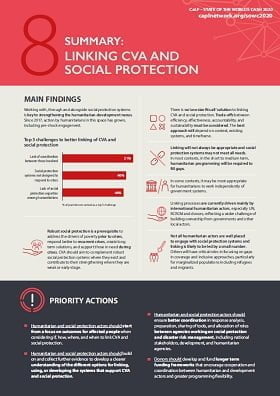
State of the World’s Cash 2020 Chapter 8 summary: Linking CVA and social protection
Report
Longstanding efforts to strengthen links between humanitarian CVA and social protection have been accelerated by the COVID-19 pandemic, with significant progress since the last report. CVA should aim to complement robust social protection systems where they exist and contribute to their strengthening where they are weak or early-stage. This chapter asks: ‘What opportunities and challenges...
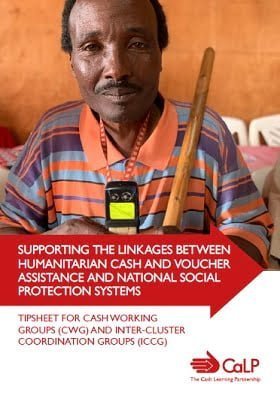
Supporting the Linkages Between Humanitarian Cash and Voucher Assistance and National Social Protection Systems
Report
This tipsheet aims to support country-level coordination efforts to strengthen the engagement between humanitarian coordination groups that implement cash and voucher assistance (CVA) and existing social
protection or disaster risk reduction coordination actors and groups. In particular, it seeks to offers inter-cluster and cash working group coordinators simple practical tips for engaging...
Case Studies

Linking CVA and Social Protection in the MENA Region – Crib sheet
Report
Building linkages between humanitarian cash and voucher assistance (CVA) and social protection (SP) has become an increasingly prominent topic over the past five years and the Middle East and North Africa (MENA) region has been at the centre of this evolution. The objective of this resource set (the crib sheet and 3, soon to be 6, regional case studies) is to ensure that the CALP Network...
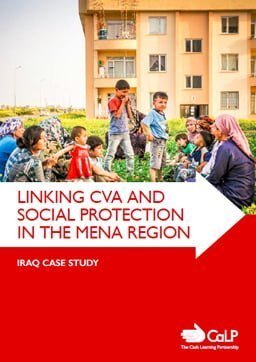
Linking CVA and Social Protection in the MENA Region – Iraq Case Study
Report
Building linkages between humanitarian cash and voucher assistance (CVA) and social protection (SP) has become an increasingly prominent topic over the past five years and the Middle East and North Africa (MENA) region has been at the centre of this evolution. The objective of this resource set (the crib sheet and 3, soon to be 6, regional case studies) is to ensure that the CALP Network...

Linking CVA and Social Protection in the MENA Region – Lebanon Case Study
Report
Building linkages between humanitarian cash and voucher assistance (CVA) and social protection (SP) has become an increasingly prominent topic over the past five years and the Middle East and North Africa (MENA) region has been at the centre of this evolution. The objective of this resource set (the crib sheet and 3, soon to be 6, regional case studies) is to ensure that the CALP Network...
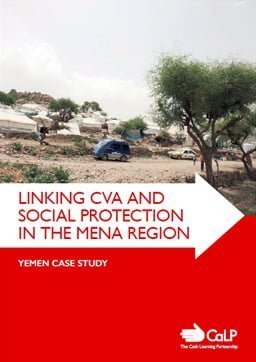
Linking CVA and Social Protection in the MENA Region – Yemen Case Study
Case Study
Building linkages between humanitarian cash and voucher assistance (CVA) and social protection (SP) has become an increasingly prominent topic over the past five years and the Middle East and North Africa (MENA) region has been at the centre of this evolution. The objective of this resource set (the crib sheet and 3, soon to be 6, regional case studies) is to ensure that the CALP Network...

Linking Cash and Voucher Assistance (CVA) and Social Protection – Occupied Palestinian Territories (OPT): Country Summary
Report
This country summary is part of a larger resource set, providing practitioners with examples of different approaches to linking CVA
and social protection.
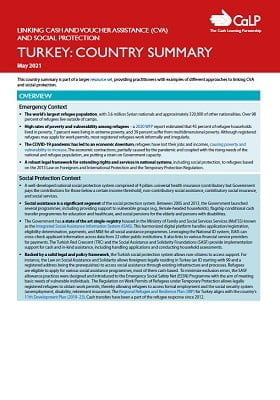
Linking Cash and Voucher Assistance (CVA) and Social Protection – Turkey: Country Summary
Report
This country summary is part of a larger resource set, providing practitioners with examples of different approaches to linking CVA
and social protection.
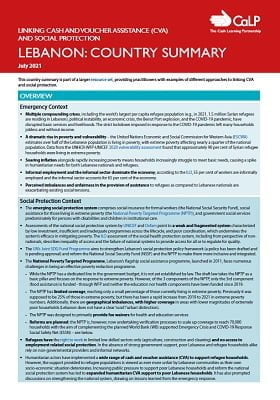
Linking Cash and Voucher Assistance (CVA) and Social Protection – Lebanon: Country Summary
Report
This country summary is part of a larger resource set, providing practitioners with examples of different approaches to linking CVA
and social protection.
Thematic lead
Latest
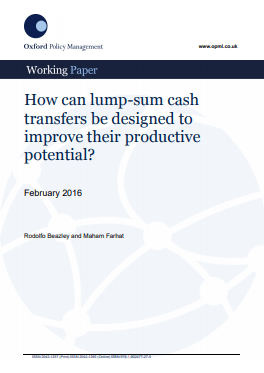
How can lump-sum cash transfers be designed to improve their productive potential?
Presentation
Cash transfer programmes are one of the most popular welfare policies in the developing world and are also backed by a large and rigorous evidence base. Besides the effects on consumption and human capital, the productive impact of cash transfers has been increasingly scrutinised. Despite the fact that...

The Impact of Earned and Windfall Cash Transfers on Livelihoods and Conservation in Sierra Leone
Report
This study by Bulte et al. measures the impact of a cash transfer programme aimed at alleviating poverty and reducing pressure on the natural environment in Sierra Leone. Researchers offered aid to 91 rural communities, which are dependent on slash-and-burn agriculture in three forms: as windfall...

Intra-Household Dynamics and the Design of Social Protection Programs: The Case of Polygamous Households in North Burkina Faso
Case Study
A recent overview of World Bank social safety net programs and gender highlighted the need for greater consideration of intra-household dynamics in the design of social protection programs (Bardasi 2014). During program design, decisions have to be made about who to target, how much and how often to give...
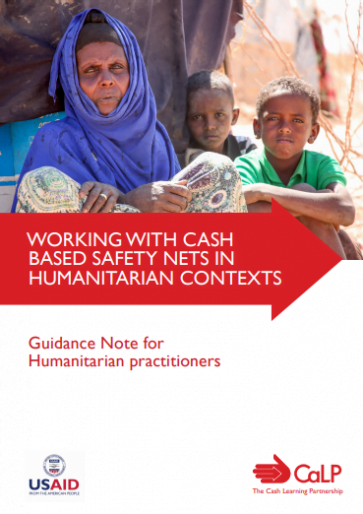
Working with Cash-based Safety Nets in Humanitarian Contexts: Guidance Note for Humanitarian Practitioners
Guidelines and Tools
Over the past decade, social protection has emerged as an important social policy measure to tackle poverty and inequality in society, and to address vulnerability to shocks. In line with these developments, there has been increasing interest in forging better links between humanitarian assistance and...

Building on social protection systems for effective disaster response: the Philippines experience
Report
How can social protection systems be used in disasters, as a complement to, or substitute for, humanitarian assistance? Oxford Policy Management led a two-year research project investigating this question, looking at the role of social protection in both mitigating the impact of large-scale shocks and...

DFID Shock-Responsive Social Protection Systems research: Literature review
Report
DFID has commissioned research into Shock-Responsive Social Protection systems, to further understand the nature of the interaction between social protection, humanitarian and disaster risk management systems and ways in which long-term social protection systems can be scaled up to
provide support in...
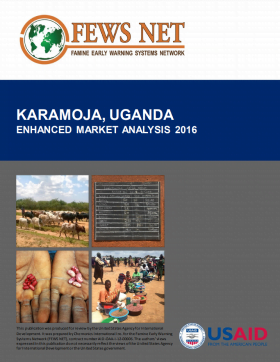
Karamoja, Uganda: Enhanced Market Analysis
Report
The Market Fundamentals reports serves as starting points for providing efficient and effective market-based response decision support for both emergency and development programs in Karamoja Region of Uganda. It examines the appropriateness and feasibility of modality response options for the region.
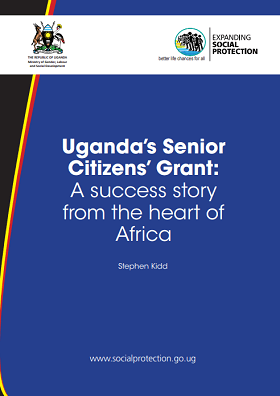
Uganda’s Senior Citizens’ Grant: A success story from the heart of Africa
Report
Since 2011, a pilot universal old age pension – known as the Senior Citizens’ Grant (SCG) – has been implemented in Uganda. By 2016, there were 125,000 beneficiaries. A number of studies have demonstrated that the scheme has had significant benefits. Despite the general economic situation worsening...

Evaluation of the Kenya Hunger Safety Net Programme Phase 2
Report
The report summaries key findings from Hunger Safety Net Programme Phase 2 Qualitative impact study conducted in August 2016. The report integrates interesting infographics that depict the findings in an easy to read and understand format

The Politics of Cash: A Case Study on Humanitarian Cash Transfers in Ukraine
Report
This case study examines the evolution of cash transfers in the humanitarian response in Ukraine. The use of cash transfers in Ukraine brought out the best and worst aspects of the international humanitarian system. Uncertainty over where cash fits into the humanitarian architecture – and whether...

Labour Market Analysis in Humanitarian Contexts. A practitioner’s guide
Guidelines and Tools
The world and the scale of complex crises are rapidly changing, thus calling for new tools and fresh approaches. This guide aims to help humanitarians conduct better labour market analyses (LMA) to inform the design and delivery of livelihoods and market strengthening programmes in emergency crisis and...
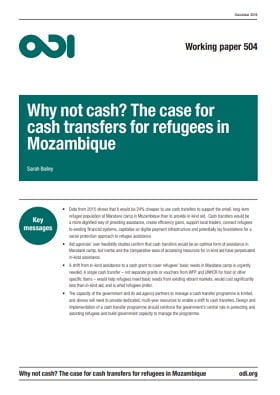
Why not cash? The case for cash transfers for refugees in Mozambique
Report
There are two areas where cash transfers could play a role in humanitarian assistance in Mozambique: in response to natural disasters and in support of the long-term refugee population. This working paper focuses on refugees. Why not cash? The case for cash transfers for refugees in Mozambique is one of a...

Working Paper 3: Shock-Responsive Social Protection in the Sahel: Community Perspectives
Report
This is the third in a series of working papers from the ongoing Shock-Responsive Social Protection Systems research. Together, the set of papers explore perspectives about the interface between social protection, humanitarian assistance and disaster risk management (DRM), to complement the formal...
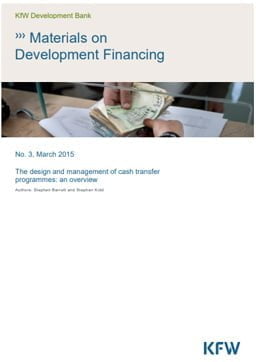
The Design and Management of Cash Transfer Programmes: An Overview
Policy paper
This paper describes and explains the operations of cash transfer schemes, outlining good practice in the design processes required to operationalize policy-level design principles. It describes the four key components comprising the administrative structure of most cash transfer programmes and, based on...
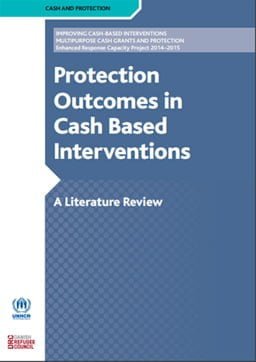
Protection Outcomes in Cash-based Interventions: A Literature Review
Report
This literature review examines existing research to determine whether the use of cash and vouchers is contributing to the promotion of protection and gender outcomes for beneficiary communities, following the WFP and UNHCR 2013 study on gender, protection and cash. This literature review focuses on these...
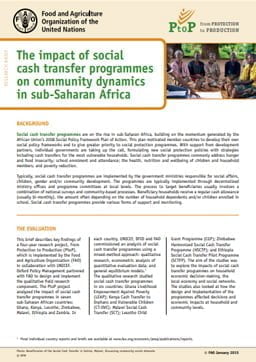
The Impact of Social Cash Transfer Programmes on Community Dynamics in Sub-Saharan Africa
Report
Social cash transfer programmes are on the rise in sub-Saharan Africa, building on the momentum generated by the African Union’s 2008 Social Policy Framework Plan of Action. This plan motivated member countries to develop their own social policy frameworks and to give greater priority to social...
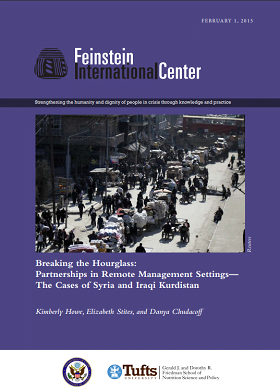
Breaking the Hourglass: Partnerships in Remote Management Settings – The Cases of Syria and Iraqi Kurdistan
Report
This study set out to examine partnerships between international and local organizations engaging in humanitarian action in remote management and insecure settings. The study was motivated by the lack of systematic research in areas where international organizations have limited access due to insecurity...
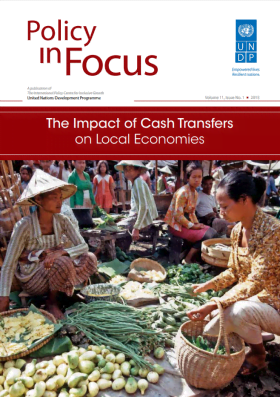
The Impact of Cash Transfers on Local Economies
Policy paper
In this special edition of Policy in Focus, leading authors and practitioners present their research on how cash transfers can impact the local economy when implemented in a developing country. The aim is to gather and review research results and evidence, obtained from various methodologies ranging from...

Are Public Works Programmes Effective in Reinforcing Social Protection Systems? Evidence from Northern Namibia
Report
This paper analyses the effectiveness of public works programmes (PWPs) in creating employment, reducing poverty and reinforcing the existing social protection system in Namibia. Using data and information from a survey conducted in northern Namibia, it is established that while public works programmes...

The Impacts of Malawi’s Social Cash Transfer Programme on Community Dynamics
Report
This short paper evaluates the impacts of Malawi’s Social Cash Transfer (SCT) programme on the household economy, the local economy and the social networks. The SCT programme was launched in Mchinji district in 2006. The programme provides regular cash payments to ultra-poor and labour-constrained...

